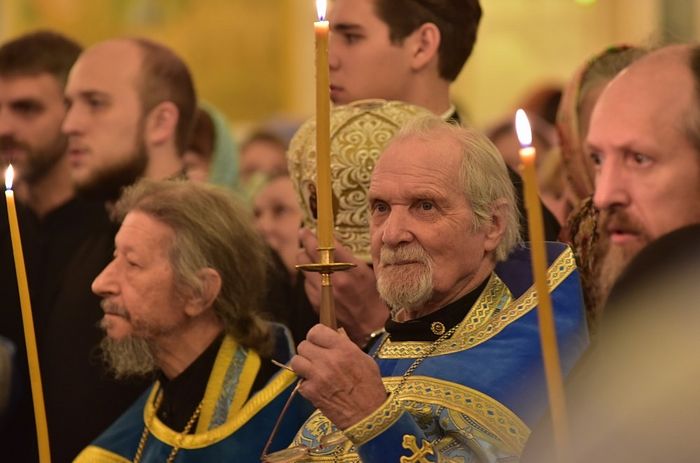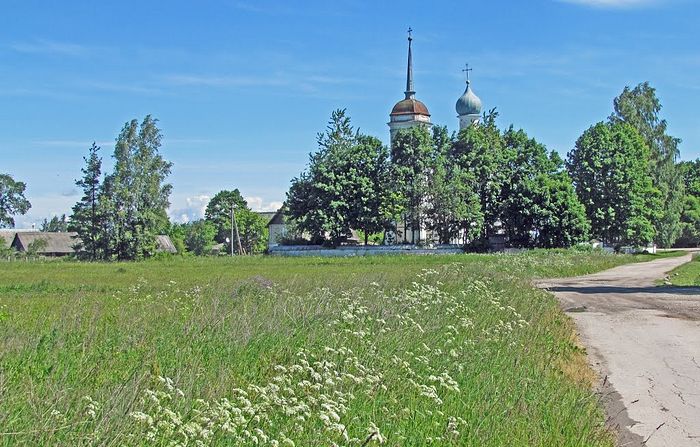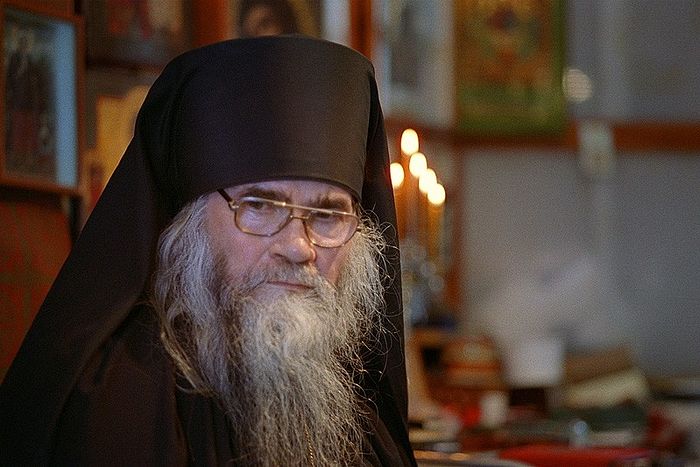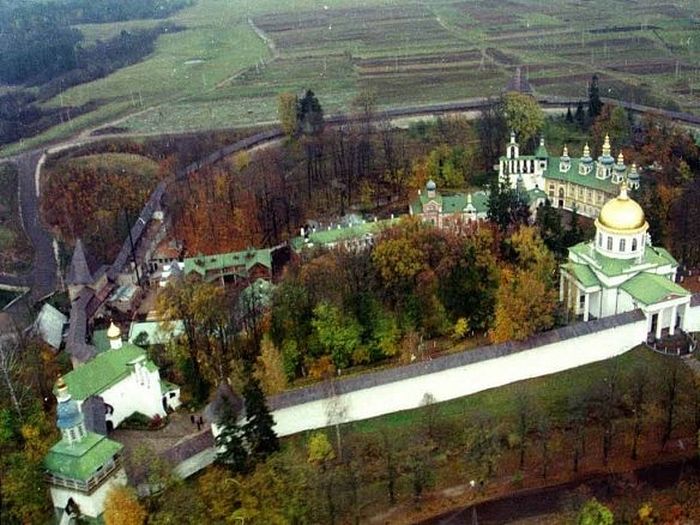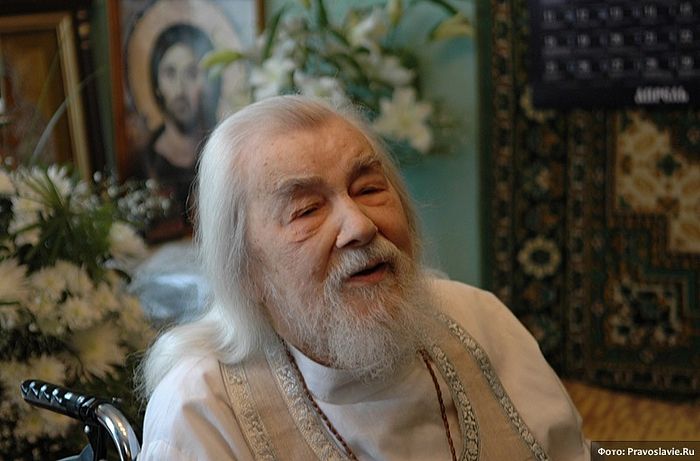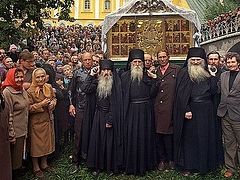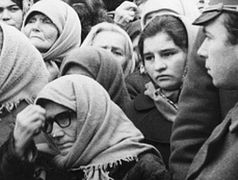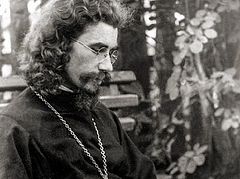Archpriest Evgeny Peleshev, the oldest clergyman in the diocese of Pskov of the Russian Orthodox Church, was from 1946 till 1951 a monastery laborer at the Pskov Caves Monastery, and served many years in the St. Barbara Church, an Estonian-language parish near the monastery. He often associated with the great elders of the Pskov Caves Monastery and knew two Russian patriarchs very well. In his interview with Pravoslavie.ru, Fr. Evgeny recalls his life at the monastery in his youth and how priests and the faithful were persecuted in the post-war Soviet period.
“Go ahead, but don’t cross yourself in the presence of others”
—Fr. Evgeny, can you tell us what it was like to be a priest under the Soviet authorities?
—Perhaps you don’t remember this time well as you were very young then. They considered us enemies of the state. Harsh anti-religious persecution resumed under Khrushchev in the early 1960s. For example, at the baptism of a child they demanded the presence of the parents with their passports.
However, I remember the following story. We were going to baptize one of my neighbors who was a member of the Communist Party. His local party leaders learned about his plans and summoned him to scold him. But he suddenly said: “Okay, that’s it. Now I am leaving the party. Here is my party-membership card!” They got frightened as they wanted to have as many party members in their district as possible. So they answered him, “Well, then no problem. Go ahead, but don’t cross yourself in the presence of others.”
—So they turned out to be tolerant of him and they even did not expel him from the party.
—Yes, because they did not want their superiors to learn that some members were leaving the party in their district.
—Judging by this story, it seems that the Soviet authorities were already losing their grip and growing weak at that time.
—Yes, the faithful did not face severe persecutions any more. They knew they would not be imprisoned for their faith, but they could be expelled from the party, which was a great shame for that period.
However, the state controlled almost all the Church affairs. It particularly controlled the church finances and all church treasurers were accountable to it. Inspectors visited the treasurer’s office twice a year and recorded the income and expenditure of a parish. In those days it was extremely difficult for the Church to even manage everyday affairs; for example, getting some paint for painting a church ceiling. So we had to manage many church affairs “with a crooked hand”, as the saying goes. Fortunately we had friends among people who were in charge of various things, and they helped us from time to time.
For twenty years I served as a priest in Zalesye—a village some five miles away from the town of Pechory. People who issued materials in Pechory were religious. I baptized their children and was not a stranger to them. And, for example, they would secretly give me twenty iron sheets.
True, these were hard times. Now everything is very different. When the current governor sees me he immediately runs up to me, and we embrace and kiss each other like brothers. That would have been inconceivable in the Soviet era. My relatives belonging to the Communist Party were afraid to say hello to me.
Which time is more favorable for salvation?
—I am going to ask you an unexpected question. On the one hand, the Church was brutally persecuted in the Soviet period. On the other hand, now we have freedom, but very strong and diverse temptations emerged with it. In your view, which time is more favorable for spiritual life and achieving salvation?
—In the Soviet era salvation was possible for those who stood firm in their faith. They were punished, even arrested, but they remained unshakable. These were genuine confessors for faith, persecuted by their state. There are no persecutions nowadays, yet each of us needs to stand firm in the faith and fulfil all the commandments that are well known to us.
—In the Soviet times there was the long line of holy elders and ascetics in Russia. Now it seems almost all of them are gone. Why so? What do you think are reasons?
—Of course, when we have freedom, we lose the firmness of faith. I think Russia still has elders, but many of them prefer to remain obscure. However, for example, there is Fr. Adrian [Archimandrite Adrian (Kirsanov)], aged ninety-two, to whom many people come for advice and blessing. Though he and Archimandrite John (Krestiankin) disagreed with each other about certain things. Fr. John gave his blessing for taking the new passports, while Fr. Adrian didn’t give his blessing for this.
—What exactly did the elder refuse to give his blessing for?
—For taking new passports and any documents of the new type. He feared some secret “666 code number”. However, Fr. John argued that a mere paper can have no effect on the salvation of soul. This is the main issue they disagreed on.
There was also Fr. Nikolai Guryanov. He was an elder respected by the whole nation, to whom many things were revealed by God. Fr. Nikolai tried to avoid popularity, but in spite of this his fame spread far and wide and people flocked to him in great numbers.
—Did you personally communicate with him?
—No, I didn’t. He was a very old man, lived far away and so didn’t visit Pechory. But when I was a young priest he was transferred to the Diocese of Pskov. I think then he made visits to Pechory, but not many people knew him at that time. We would greet and say good-bye to each other at the most. It was much later that he became a highly esteemed elder. He was a great elder indeed, a very loving one, who didn’t scold or offend anyone. Sinners used to come to him and he never reproached them, because who is without sin among us?
Once I came to the island of Talabsk (Zalit) to commemorate Fr. Nikolai on August 24 [the anniversary of his repose] and saw a line of hundreds of cars, buses and other vehicles approximately a mile long. Can you imagine this? And batiushka lived on the island, so visitors had to take boats across the lake as well. If the weather is calm it is safe to travel by boat, otherwise it may be dangerous. But people keep flocking to him. The most remarkable thing is that the majority of today’s pilgrims are young people. If earlier these were mainly aged women, then today their age is between thirty and forty.
—So few young people were church-goers in the Soviet era?
—If you worked at a school or a community center, then you could go to church only secretly. I served in the village for about twenty years and I saw almost no men or teenage boys in the church.
—Why so?
—People had fear. For example, if a driver of a new car was caught in a church, then his car was immediately confiscated, and the driver was either fired or set to work on a tractor.
—And what about the women? Were they afraid of this?
—“You can’t squeeze water out of a rock,” as the saying goes. Most village women worked as swineherds or dairymaids. How could you punish them?
But as the years went by, many things changed. Let us take church weddings. At first all couples married in Church at the rural parish where I served for twenty years. Even some city residents would come here “on the sly”. Sometimes I had to perform the sacrament of matrimony over couples at night. Especially those who held high positions were afraid of being noticed and so they would come in the middle of the night.
—Do you remember who those people were?
—Doctors, teachers. At first I married in church up to twenty couples in the village per year. After some fifteen or twenty years there were fewer couples. Over the time of my ministry, which lasted for sixty-two, years I married around 1000 couples. However, with time the number of couples dropped.
—And what is the reason, batiushka?
—More churches were opened in the neighborhood after the collapse of the Soviet Union—in Maysky district and other places. So the parishioners scattered.
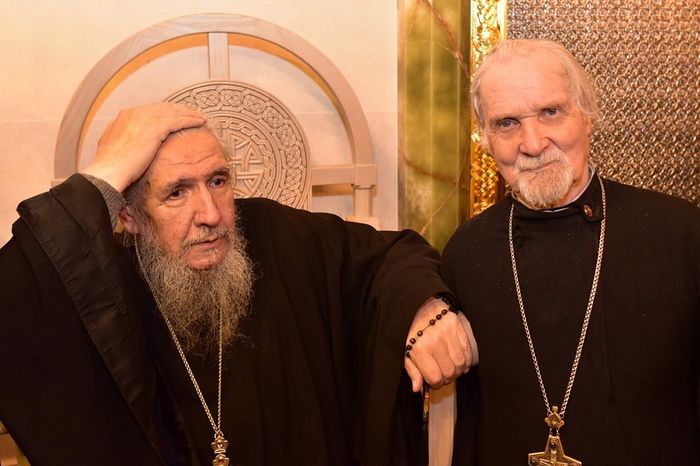 Archimandrite Anthony (Guliashvili) and Archpriest Evgeny Peleshev. Photo by Anatoly Goryainov / Pravoslavie.ru)
Archimandrite Anthony (Guliashvili) and Archpriest Evgeny Peleshev. Photo by Anatoly Goryainov / Pravoslavie.ru) It would be wrong to say that the Soviet-era believers were pious and modern believers are feckless
—Do you see any differences between believers of the Soviet times and modern believers? Or they are not very different?
—I don’t think they are very different. Today pastors have freedom to preach from the ambo and people have an opportunity to read many spiritual books. In the USSR we could hardly get any spiritual literature. In those days a priest couldn’t say from the ambo: “Go to church, pray, be faithful, ignore the state.” And now they call the faithful to a pious Christian life freely. I think it is good and that really helps people.
Besides, there are experienced elderly priests in small towns and monasteries who instruct people. And the locals try to keep fasts and go to church regularly. I know dozens and maybe even hundreds of people here in Pechory who attend church very often. So I cannot say that those believers were particularly pious and modern believers are feckless. Freedom gave people a greater opportunity to go to church and be closer to God.
—In your view, what circumstances of our days do we need to pay attention to in order to remain genuine Christians?
—The most essential thing is your faith. If you have faith, you will have the truth, mercy, kindness, humility and the ability to forgive. Maybe there are not so many people of this kind nowadays, but they exist and you still can find them.
I know absolutely everybody in our small town. I was fifteen when I came to the monastery. Seventy-one years have passed since then. All old people departed this life—I buried all of them; and as for young people, I baptized all of them. Some sixty-year-old man can come to me and said, “Batiushka, you baptized me!” And he is already not young himself. And there are lots of such elderly men in Pechory today.
In 2002 I was the first to be awarded honorary citizenship and was given a badge of honor. The monastery’s superior and I are among the guests for City Day now. People pay respect to me. It would not have happened in the Soviet period.
—What was your attitude towards Communists, members of the Communist Party in the Soviet era? Did you regard them as your persecutors and enemies?
—I did not hate them and did not bear them malice. Once I was fined 500 rubles only for walking after a funeral ceremony to the cemetery in my vestments. It was a great sum at that time because an average salary was only 100 rubles. So I had to give them five monthly pays. And I also was warned: “If you do it again, we will imprison you for a year.”
But, nevertheless, people came to me in numbers, especially Estonians. We had an Estonian church and I served in Estonian for five years. Initially, there were few Russians, but as soon as I began to serve in Russian [Church Slavonic] their number considerably increased.
—So you didn’t feel at that time that you were living in an occupied country?
—No, I didn’t. Of course, I was despised and allowed to give Communion only to sick people. Other than that, any services, any blessings of flats, houses or cars were prohibited. At times I even baptized people at home and secretly. For example, when some granny with a child came to me, my wife would become a godmother because there was no alternative.
Two patriarchs
—Please, can you tell us something about Patriarch Alexy II who was close to you?
—Yes, we were friends. And we were peers: Alexy (Alexei) was born in 1929, and I was born in 1930. It means that we were almost of the same age.
In 1952, on the feast-day of the Greatmartyr Barbara, Bishop Roman of Tallin [the future Archbishop Roman (Tang) of Lithuania and Vilnius (1893-1963)] and I served in Narva. The future Patriarch was invited and awarded a kamilavka [a stiff hat given to Orthodox clergy as a mark of honor].
—You were Vladyka Roman’s subdeacon, weren’t you?
—I was his subdeacon, cell-attendant and cook. I spent each day with him. So we served in Narva because the rector of a local church decided to invite the Vladyka on that day. And the bishop invited Fr. Alexy to Narva for the awarding ceremony. It was me who came out with the kamilavka as a subdeacon. We sang “Axios!” and the bishop presented a congratulatory address.
My mother was a parishioner at the Tallin church where the future patriarch’s father, Archpriest Michael Ridiger, served. At that time I was a seminary student and I would come to my mother for the Christmas holidays, attend their church, read the Apostolic Epistle and Hours there. We maintained good relations. For example, after services at the cathedral we would immediately go to the house of Fr. Michael and his wife and have a meal together.
When Alexy served as Patriarch, I once visited him at Chisty Lane in Moscow. He received me and gave me presents to remember him by. When he reposed I was present at his funeral, and I was talked into serving a little. We were given five to ten minutes for serving a Litia, and I read my exclamation in Estonian. Many were surprised, but Alexy II had served in Estonia for thirty years before being elected a new Patriarch and headed the Diocese of Tallin for twenty-five years. Every time we met we tried to speak in Estonian a little. I would ask him: “Do you still remember your Estonian?”
—Did Alexy II speak Estonian fluently?
—Though he was not a fluent speaker, he did have some intermediate level of Estonian. The same can be said about me; and I don’t know some scientific and technical terms either.
—I am aware that you also knew Patriarch Pimen quite well.
—I lived together with Patriarch Pimen (then Archimandrite) in the monastery for four years. He was thirty-nine when he came to us as a young priest. I met with him almost every day and spoke with him. For example, when we were mowing grass or reaping rye, he would come up to us and ask: “Zhenya [a diminutive form of the name Evgeny], can you show me how to reap?” And I would answer: “Father-superior, do it like this.” Once he came up to me (I was a monastery bell-ringer and lived in the bell-tower at one point) and asked: “Zhenya, teach me how to ring the bells.” And he was twenty years my senior—he was born in 1910.
Patriarch Pimen had profound spiritual experience and celebrated the Liturgy wonderfully. He was also a brilliant and eloquent preacher, like Chrysostom.
By the way, now I am serving under the fourth patriarch. For fifteen years I served as a priest under Patriarch Alexy I, then for twenty years, under Patriarch Pimen1, next—for twenty years under Patriarch Alexy II2, and, finally, I have served under Patriarch Kirill for about nine years.
—Can you tell us when you came to the Pskov Caves Monastery as a monastery worker?
—I came to the Pskov Caves Monastery in 1946 when I was fifteen years and three months old.
—Why did you decide to do it?
—In my childhood I lived in the village of Pühtitsa, near the famous Pühtitsa Convent. I used to run there for every service and I had an ardent desire to serve the Church. The yearning was so intense that I walked 250 kilometers [c. 155.3 miles] from Pühtitsa, my birthplace, to Pechory.
I recall how my mother used to give me some money so that I could go to the cinema (the local cinema showed films once or twice a month). But, instead of going to cinema, I would buy candles and go to church. I was a bell-ringer at Pühtitsa Convent and helped the sisters. There lived one Elena there, a sort of a “fool-for-Christ”, so she taught and instructed me.
One clairvoyant priest who lived there, Fr. Simeon, predicted my priesthood (though not to me directly, but to one woman). I lived at their bell-tower for the final five months of my stay there, and his little window opened on the stairs leading to the bell-tower. One day after dinner he looked out of the window and said, “I see a priest walking by.” The woman answered him: “No, Father Simeon. It is Zhenya who has just walked past.” But Fr. Simeon replied: “He will become a priest in due time.”
—Please, tell us a little about Fr. Nathaniel, a famous treasurer of the Pskov Caves Monastery.
—Fr. Nathaniel joined the monastery in 1947, one year after me. His secular name was Kronid. He always led an ascetic life. On non-fast days each of us was usually given half a liter of milk, but he gave me his milk every time. We lived in the same cell together; sometimes I would wake up in the middle of the night and see him lying on the floor parallel to his bed. He was tonsured a monk very quickly—he was ordained a hierodeacon in 1948 when he was thirty. And he held this rank at the monastery for forty years. Only then was he ordained a hieromonk; and, one month later, he became an archimandrite.
Fr. Nathaniel was not so much educated as he was spiritually experienced. Distinguished people (cosmonauts, “the top brass” etc.) would come to the monastery from Moscow. Fr. Nathaniel took them round the Caves, showed and explained them everything. And they nearly began to believe in God after that. We lived in the same cell for five years.
When I became a priest, the monastery nevertheless remained like home for me. I visited it all the time, and three generations of monks passed by there before my very eyes.
—For many years you served for Estonians and among Estonians. Are there many Orthodox Christians among them?
—The Estonian Orthodox are called Setos [an indigenous ethnic and linguistic minority in south-eastern Estonia]. They are a tiny group and live mainly here in the Pechory district and in the adjacent territory of Estonia. They still come to our church for some feasts and we try to serve in Estonian on those days. As religious people they were better than Russians.
—Why were they better than Russians as religious people?
—They were closer to the Church: More of them married in Church, were baptized, confessed and attended prayer services. When Setos had a funeral, their relatives from all over the neighborhood would come to it.
—Did you often come to visit or stay in Tallin?
—When I served as Bishop Roman’s subdeacon I lived there for over two years. Now Metropolitan Cornelius serves there. He was tonsured a monk in Pechory, and we were friends when he served as a priest. I still go there quite frequently.
—Do you need to get a visa in order to go there?
—I have an Estonian passport because I was born in Estonia, in a village of Ida-Virumaa County. Its principal cities are Rakvere, Narva. I have my birth certificate which was issued in Estonian.
—Do you like Estonia?
—There is order, culture, cleanness there. Every village is all in bloom.
—They must be very different from our villages.
—Indeed they are! Even Estonian towns are full of flowers and are very clean. In this respect, Estonians have a higher level of culture. By the way, I have a brother living in Narva, he was born in 1923.
—What was his job? Who is he by profession?
—He worked at a cotton-printing factory all his life; though, of course, he retired many years ago. His other half died, it was I who buried his Marishka [here: most probably a diminutive form of the name Marina]. Now only he and I are the only ones left of all our siblings. He is the oldest, I am the youngest, with seven years difference. Our sister and two brothers sadly died.
—Please, can you talk more about Fr. John (Krestiankin)? Did you see him regularly?
—Of course I did. I was at the monastery nearly every day, rang the bells and celebrated services. He was a wonderful elder. He came to us in 1966 or 1967, when I already was a priest. He was very gentle and mild with everyone, though sometimes he could speak out against certain things or scold you a little, if it was necessary. But he never was a superior or a superior’s assistant. He was no more than a batiushka, a pastor. He attended almost all church services and was a man of prayer. He became famous because he had a great gift of prophecy and many things were revealed to him by God.
Potato soup on Sundays and festivals
—How difficult was monastic life after the [Second World] War?
—In my time it was very hard. When I came to the monastery in 1947, they bought a “one-and-a-half-ton truck” [thirty-hundred-weight truck] and trained me to drive it. So I became a monastery truck driver. It was the devastation of the post-war period as the monastery had been damaged by bombs. During the war Bishop Macarius was killed there. A bomb fell very near as he was praying. The refectory windows were boarded up for several years. I had to restore all of this.
—Were there problems with food?
—All of us were very hungry. We were given 600 grams of bread per day and nothing else. Only cabbage was in abundance. We were content even with one pickled cucumber. There were no potatoes. We cooked soup out of anything that came to hand, and on Sundays and feast days we had potato soup. There was no refectory so we took food with us; there were only two meals a day—dinner [midday meal] and supper, which we cooked out of anything that was handy.
It was cold, but we had no firewood. During the Nativity Fast of 1946 we were sent to a forest where we sawed 150 cubic meters of wood. Eight people, including me—just a boy—sawed trees into firewood for a whole month. There were no implements at that time: we did everything by hand. While two of us were sawing, another team of two was lopping off branches, heaping them on and burning them. We worked this way every day over a month without returning to the monastery. It was almost on the eve of the Nativity that we finished our work and returned back to the monastery.
These and many other details can be found in my book, entitled The Change of Fate and Other Stories of the Pskov Caves. I occasionally re-read this book of mine and cry.
—Why do you cry?
—Because life was so hard and we were hungry and cold.
—But, despite this, you have very fond memories…
—Especially of the period of my youth. Can you imagine this? At that time many people preferred to have fun and go to the cinema, whereas I lived with old men. I needed to amuse myself and them somehow. So I “performed miracles” for them, and so did they.
—What else stuck in your memory? I mean the period of your life at the monastery.
—Our doors were never closed. You could come to any monk and find that the door of his cell was open, while he was away at a church service. Such was the truthfulness, openness of our times.
And we continued in this way afterwards. Wherever I was, wherever I served, everything was open and visible, and we did not take anything that belonged to somebody else. And I always tried to be kind and compassionate for all—something that I had been used to from my youth.
—Thank you, batiushka.

